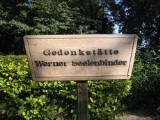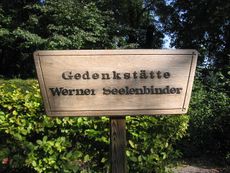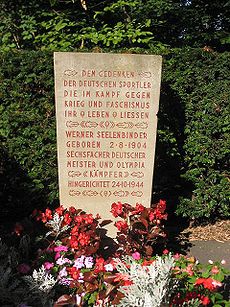
Werner Seelenbinder
Encyclopedia
Werner Seelenbinder was a German
communist and wrestler
.
, Pomerania, and became a wrestler after training as a joiner. He had connections with the young people's workers' movement from an early age. In 1928 and 1929 he won the Spartakiade in Moscow
; over 200 German sportsmen were banned from the contest, but Seelenbinder, with his interest in Marxism
, took part. His first trip to Moscow had already persuaded him to become a member of the German communist party, the KPD
. In 1933 he refused to give the Hitler salute
when receiving his medal at the German Wrestling Championship, and was rewarded with a sixteen-month ban on training and sports events.

 German workers' sports clubs were soon banned by the Nazi party
German workers' sports clubs were soon banned by the Nazi party
; at this point the KPD approached Seelenbinder, asking him to join one of the legal sports clubs, to train to get as much sporting success as possible, so he would be able to carry messages across Germany and into other countries. As one of the country's top sportsmen he had more freedom of movement and could travel abroad. As well as preparing for the Olympics
, Seelenbinder joined the Uhrig Group, an underground resistance group named after Robert Uhrig
, who organized it.
. He had originally planned to boycott it, but friends persuaded him to compete anyway, win, and defy the Nazis
by not giving the required "Heil Hitler!" salute, but to use a vulgar gesture instead. This plan was foiled when he lost the first match. He eventually came in fourth in the event.
The Nazis had only allowed Seelenbinder to take part in the Olympics because they thought he would secure them a medal: otherwise, they did not trust him in the slightest. Seelenbinder's illegal activities as a courier and his participation in the Uhrig Group had caught their attention: he was arrested, along with 65 other members of the group, on 4 February 1942 and after being tortured for eight days ,and enduring nine camps and prisons for two and half years, he was sentenced to death by the Volksgerichtshof, he was executed for treason on October 24, 1944, at Brandenburg-Görden Prison
- he was beheaded with an axe. The imprisonment left him weighing a mere 60 kilograms (132 pounds), from his previous weight of 90 kilos (198 pounds).
In his farewell letter, he wrote to his father :
, and that there were no reliable biographies.
On 2 August 2004 a commemorative speech was held in front of the Neukölln
stadium, where Seelenbinder's ashes were buried, by the German socialist PDS party, one hundred years after Seelenbinder's birth. Party members spoke of their regret that the stadium had been renamed. Others mentioned with sadness the renaming of the eastern German "Werner-Seelenbinder-Halle" as "Velodrom im Europasportpark" in 1990 and the renaming of the "Werner-Seelenbinder-Turm" in Leipzig
as the "Glockenturm".
On 24 October 2004, the 60th anniversary of Seelenbinder's death, the Neukölln stadium was once again renamed the "Werner-Seelenbinder-Stadion" in his memory.
Germany
Germany , officially the Federal Republic of Germany , is a federal parliamentary republic in Europe. The country consists of 16 states while the capital and largest city is Berlin. Germany covers an area of 357,021 km2 and has a largely temperate seasonal climate...
communist and wrestler
Amateur wrestling
Amateur wrestling is the most widespread form of sport wrestling. There are two international wrestling styles performed in the Olympic Games under the supervision of FILA : Greco-Roman and freestyle. Freestyle is possibly derived from the English Lancashire style...
.
Early years
Seelenbinder was born in SzczecinSzczecin
Szczecin , is the capital city of the West Pomeranian Voivodeship in Poland. It is the country's seventh-largest city and the largest seaport in Poland on the Baltic Sea. As of June 2009 the population was 406,427....
, Pomerania, and became a wrestler after training as a joiner. He had connections with the young people's workers' movement from an early age. In 1928 and 1929 he won the Spartakiade in Moscow
Moscow
Moscow is the capital, the most populous city, and the most populous federal subject of Russia. The city is a major political, economic, cultural, scientific, religious, financial, educational, and transportation centre of Russia and the continent...
; over 200 German sportsmen were banned from the contest, but Seelenbinder, with his interest in Marxism
Marxism
Marxism is an economic and sociopolitical worldview and method of socioeconomic inquiry that centers upon a materialist interpretation of history, a dialectical view of social change, and an analysis and critique of the development of capitalism. Marxism was pioneered in the early to mid 19th...
, took part. His first trip to Moscow had already persuaded him to become a member of the German communist party, the KPD
Communist Party of Germany
The Communist Party of Germany was a major political party in Germany between 1918 and 1933, and a minor party in West Germany in the postwar period until it was banned in 1956...
. In 1933 he refused to give the Hitler salute
Salute
A salute is a gesture or other action used to display respect. Salutes are primarily associated with armed forces, but other organizations and civil people also use salutes.-Military salutes:...
when receiving his medal at the German Wrestling Championship, and was rewarded with a sixteen-month ban on training and sports events.


National Socialist German Workers Party
The National Socialist German Workers' Party , commonly known in English as the Nazi Party, was a political party in Germany between 1920 and 1945. Its predecessor, the German Workers' Party , existed from 1919 to 1920...
; at this point the KPD approached Seelenbinder, asking him to join one of the legal sports clubs, to train to get as much sporting success as possible, so he would be able to carry messages across Germany and into other countries. As one of the country's top sportsmen he had more freedom of movement and could travel abroad. As well as preparing for the Olympics
Olympic Games
The Olympic Games is a major international event featuring summer and winter sports, in which thousands of athletes participate in a variety of competitions. The Olympic Games have come to be regarded as the world’s foremost sports competition where more than 200 nations participate...
, Seelenbinder joined the Uhrig Group, an underground resistance group named after Robert Uhrig
Robert Uhrig
Robert Uhrig was a German communist and resistance fighter against National Socialism.- Background :Born in Leipzig, the son of a metalworker, Uhrig grew up to become a journeyman toolmaker. He joined the Communist Party of Germany in 1920 and took several courses at the Marxist Workers' School...
, who organized it.
1936 Olympics and arrest
As a committed communist Seelenbinder was appalled by the 1936 Olympic Games that were to be held in Nazi GermanyNazi Germany
Nazi Germany , also known as the Third Reich , but officially called German Reich from 1933 to 1943 and Greater German Reich from 26 June 1943 onward, is the name commonly used to refer to the state of Germany from 1933 to 1945, when it was a totalitarian dictatorship ruled by...
. He had originally planned to boycott it, but friends persuaded him to compete anyway, win, and defy the Nazis
Nazism
Nazism, the common short form name of National Socialism was the ideology and practice of the Nazi Party and of Nazi Germany...
by not giving the required "Heil Hitler!" salute, but to use a vulgar gesture instead. This plan was foiled when he lost the first match. He eventually came in fourth in the event.
The Nazis had only allowed Seelenbinder to take part in the Olympics because they thought he would secure them a medal: otherwise, they did not trust him in the slightest. Seelenbinder's illegal activities as a courier and his participation in the Uhrig Group had caught their attention: he was arrested, along with 65 other members of the group, on 4 February 1942 and after being tortured for eight days ,and enduring nine camps and prisons for two and half years, he was sentenced to death by the Volksgerichtshof, he was executed for treason on October 24, 1944, at Brandenburg-Görden Prison
Brandenburg-Görden Prison
Brandenburg-Görden Prison is located on Anton-Saefkow-Allee in the Görden section of Brandenburg an der Havel. Erected between 1927 and 1935, it was built to be the most secure and modern prison in Europe. It was a Zuchthaus for inmates with lengthy or life sentences at hard labor, as well as...
- he was beheaded with an axe. The imprisonment left him weighing a mere 60 kilograms (132 pounds), from his previous weight of 90 kilos (198 pounds).
In his farewell letter, he wrote to his father :
- The time has now come for me to say goodbye. In the time of my imprisonment I must have gone through every type of torture a man can possibly endure. Ill health and physical and mental agony, I have been spared nothing. I would have liked to have experienced the delights and comforts of life, which I now appreciate twice as much, with you all, with my friends and fellow sportsmen, after the war. The times I had with you were great, and I lived on them during my incarceration, and wished back that wonderful time. Sadly fate has now decided differently, after a long time of suffering. But I know that I have found a place in all your hearts and in the hearts of many sports followers, a place where I will always hold my ground. This knowledge makes me proud and strong and will not let me be weak in my last moments.
Memorials and controversy
On 29 July 1945 an urn containing Seelenbinder's ashes was buried at the site of his old club, the Berolina 03 Sports Club stadium in Berlin. At the same time, the stadium itself was named "Werner-Seelenbinder-Kampfbahn", but as Communism became a bad word in West Berlin, it was renamed "Stadion Neukölln" in 1949. A number of schools, streets and sporting facilities in the former East Germany were named after him. The Werner Seelenbinder Wrestling Tournament is still (2004) held once a year in Berlin. However, the lack of impartiality by both the anti-communist West Germans and the pro-communist East Germans, who raised Werner Seelenbinder to the status of an icon, means that today his historical importance is rather controversial. In an article in the socialist German newspaper Neues Deutschland of August 2, 2004, the director of the Berlin Sports Museum Martina Behrendt said that his role in the resistance movement had been exaggerated in the GDRGerman Democratic Republic
The German Democratic Republic , informally called East Germany by West Germany and other countries, was a socialist state established in 1949 in the Soviet zone of occupied Germany, including East Berlin of the Allied-occupied capital city...
, and that there were no reliable biographies.
On 2 August 2004 a commemorative speech was held in front of the Neukölln
Neukölln
Neukölln is the eighth borough of Berlin, located in the southeastern part of the city and was part of the former American sector under the Four-Power occupation of the city...
stadium, where Seelenbinder's ashes were buried, by the German socialist PDS party, one hundred years after Seelenbinder's birth. Party members spoke of their regret that the stadium had been renamed. Others mentioned with sadness the renaming of the eastern German "Werner-Seelenbinder-Halle" as "Velodrom im Europasportpark" in 1990 and the renaming of the "Werner-Seelenbinder-Turm" in Leipzig
Leipzig
Leipzig Leipzig has always been a trade city, situated during the time of the Holy Roman Empire at the intersection of the Via Regia and Via Imperii, two important trade routes. At one time, Leipzig was one of the major European centres of learning and culture in fields such as music and publishing...
as the "Glockenturm".
On 24 October 2004, the 60th anniversary of Seelenbinder's death, the Neukölln stadium was once again renamed the "Werner-Seelenbinder-Stadion" in his memory.
Further reading
- Rote Sportler im antifaschistischen Widerstand. Volume 1. Biografisches über Ernst Grube, Bernhard Almstadt, Werner Seelenbinder, Fritz Lesch und Paul Zobel. Bundesvorstand des DTSB der DDR (Hrsg.); Berlin 1978
- Heinz Bergschicker. Deutsche Chronik 1933-1945. Ein Zeitbild der faschistischen Diktatur /Wiss. Beratung: Olaf Groehler. Verlag der Nation, Berlin 1981, 2. dgs. 1982 Edition (excerpt, p. 175)
- Walter Radetz, Der Stärkere, Verlag Neuer Weg, 1981. ISBN 3-88021-035-7
- Karl Heinz Jahnke. Ermordet und ausgelöscht. Zwölf deutsche Antifaschisten. Ahriman, Freiburg i. Br. 1995, ISBN 978-3-89484-553-7, p. 106–114.
- Stephan HermlinStephan HermlinStephan Hermlin , real name Rudolf Leder, was a German author. He wrote, among other things, stories, essays, translations, and lyric poetry and was one of the more well-known authors of former East Germany.- Life :...
. Die erste Reihe, Verlag Neues Leben, Berlin 1951, page 77ff of the Fifth Edition (1985)

